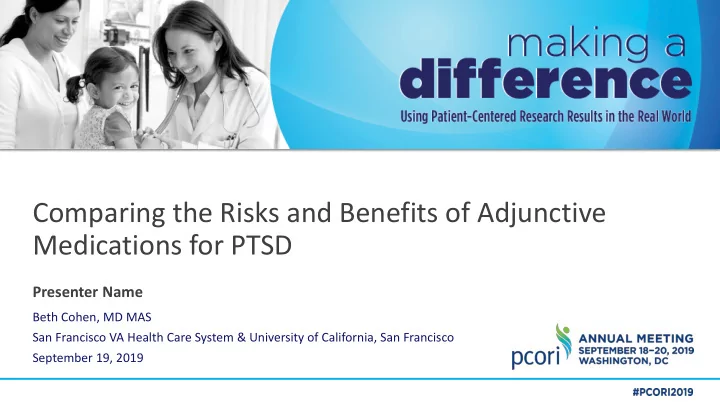

Comparing the Risks and Benefits of Adjunctive Medications for PTSD Presenter Name Beth Cohen, MD MAS San Francisco VA Health Care System & University of California, San Francisco September 19, 2019
Beth Cohen • Has nothing to disclose. 2
Challenges in Pharmacologic Treatment of PTSD • In RCTs of first-line serotonin reuptake inhibitor (SRI) therapy: - 40% of patients do not have clinically significant improvements in PTSD symptoms - 70% do not achieve remission • Little evidence on what to do next 3
Our Initial Research Goal • Many patients are prescribed antipsychotic medications - mixed evidence in trials - only 1 trial specifically in patients already on SRIs - many concerning metabolic side effects To determine the risks and benefits of adding antipsychotics to an SRI in patients with PTSD? 4
Feedback from Partners • Patient partners: - many different types of medications used - “you feel like a guinea pig” - wanted information to participate in shared decision making • Stakeholder partners: - providers want to “do something” - no studies compare strategies, so there is no guidance 5
Our Updated Research Goal • To compare the risks and benefits of several medications that are commonly added to SRIs: - antipsychotics - mirtazapine - tricyclic antidepressants - prazosin 6
Methods • National VA electronic records 2007-2015 • PTSD but no bipolar/psychotic disorder • SRI ≥ 30 days • Augmenting medication added for ≥60 days: - Antipsychotics (N=70,900) - Mirtazapine (N=54,672) - Tricyclics (N=21,984) - Prazosin (N=100,269) • Compare outcomes in 1 year before vs. after addition of augmenting medication 7
Methods: Outcomes • Benefits: - PTSD symptoms (PTSD Checklist) - Mental health ER visits and hospitalizations - Suicidality 8
Methods: Outcomes • Risks: - Weight - Blood pressure - Labs: cholesterol, glucose, hemoglobin A1c - Cardiovascular disease events 9
Results: PTSD Symptoms - On average, each group had very small improvements after addition of augmenting med - Similar by medication class 10
Results: PTSD Symptoms - PTSD symptoms gradually increase and peak around time Rx is added - In 3-4 months, symptoms return to baseline levels 11
Mental Health Emergency Room Visits - Augmenting med groups have different baseline mental health ER visit rates but % improvement is similar - In contrast to PTSD symptoms, there were more substantial average reductions ER visits 12
Suicidal Thoughts - Small but clinically meaningful reductions in suicidal thoughts - Biggest improvements with prazosin and antipsychotics 13
Weight - Most weight gain with antipsychotics/mirtazapine and no return to baseline 14
Hemoglobin A1c - Greatest increase with mirtazapine and tricyclics 15
Other Metabolic Outcomes • Triglycerides: increased 3-8% except for prazosin • No significant increases in blood pressure or cholesterol, but: - 20-30% increased/started medications to treat • Increase in diagnoses of cardiovascular disease events 16
Summary • 2 nd line medications may be useful when PTSD symptoms worsen • Benefits similar across classes • Use associated with weight gain and other metabolic risks: mirtazapine>antipsychotics>tricyclics>prazosin 17
Next Steps • Presenting locally and nationally • Working with stakeholder partners- NCPTSD, VA Office of Mental Health Operations • Compare to a “control” group with inadequate SRI response • Identify which patients are most likely to benefit 18
Thank You • Project Team: Nancy Bernardy, Shira Maguen, Thomas Neylan, Annie Ryder, Karen Seal, Janet Tang, Ana-Marie Urbieta, Ilse Weichers, Anne Woods, Dmitri Young • VA Measurement Science QUERI: Mary Whooley, Craig Meyer, Niru Krishnamurthi, David Schopfer, Hui Shen, Katherine Williams, Ning Zhang • Funding: PCORI 19
Learn More • www.pcori.org • info@pcori.org • #PCORI2019 20
Questions? 21
Thank You! Beth Cohen Comparing the Risks and Benefits of Adjunctive Medications for PTSD September 19, 2019 22
Recommend
More recommend